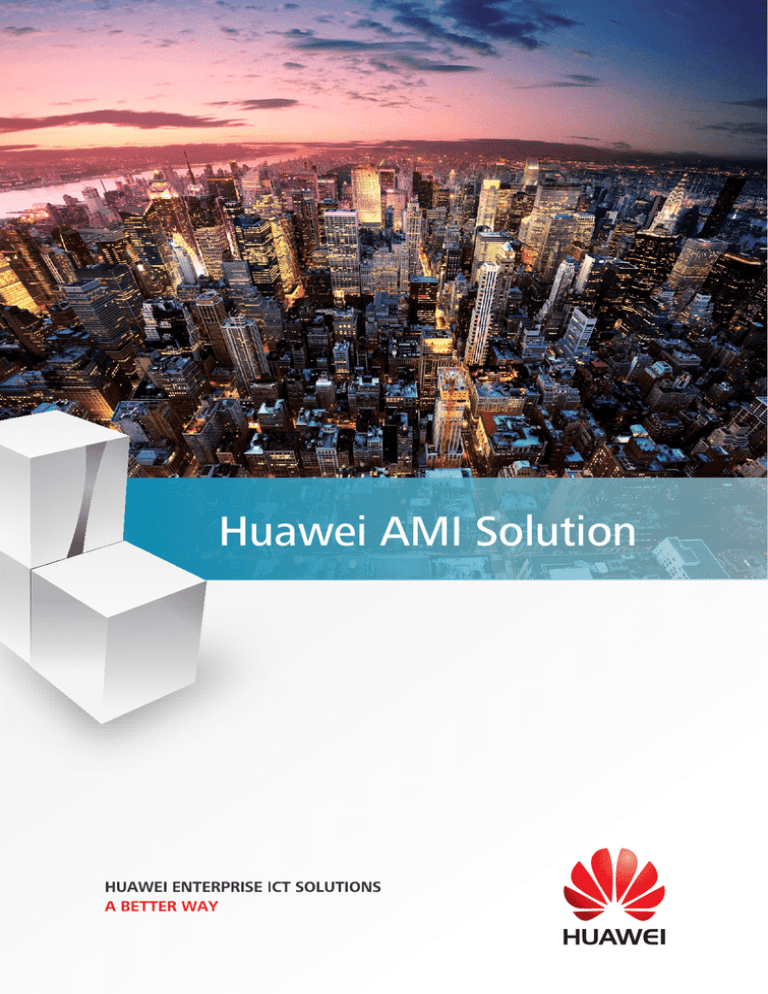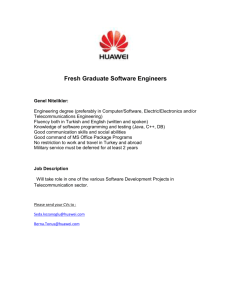
Huawei AMI Solution
Huawei AMI Solution
Consumers are more and more aware of the necessity to save energy in their home and
to get a consumer cost effective monthly bill. In the next step they are adopting not
only being consumers but also producers of energy, which would require an additional
infrastructure. Conventional manual metering approaches face some critical challenges
brought by the surge in power consumption and the expanding business scope of power
companies. Such as:
Forward
•
Cannot acquire and analyze real-time power consumption which is necessary for
effective line loss analysis.
•
Low efficiency and errors and low accuracy are inevitable in manual meter reading.
•
Cannot achieve pre-payment at multiple rates, remote control, or anti-power-stealing
etc.
The key is to deploy Advanced Metering Infrastructure (AMI) in the power grids. AMI's upfront benefit is its ability to facilitate a favorable interaction between power companies
and customers. To illustrate, it allows power companies to keep precise tabs on power
consumption and lets consumers take actions to optimize their power use.
01
Huawei AMI Solution
Huawei AMI Solution
02
Huawei AMI Solution
Huawei AMI Solution
Solution Introduction
As a leading global ICT solutions provider, Huawei has brought
its ICT extensive experience in the electric power industry into
the AMI solution that helps power companies leverage such
functions as smart metering, line loss analysis, and devicebased customer interaction. Such a solution promises better
user experience, power quality, and operating efficiency while
reducing consumption, carbon emission, and operating costs.
Huawei provides AMI solution consisting of a master station
– DCP (Data Collection Platform), WAN (Wide Area Network),
and NAN (Neighborhood Area Network).
DCP: The DCP contains a head-end system and a meter
data management system (MDMS). The head-end system
interacts with devices, manages communications protocols,
adapts internet protocols, and collects and stores metering
data. Thus, the Head-end system is also named Meter data
collection system(MDCS). The MDMS focuses on business
applications. It manages data analysis, monitors the operating
status of systems, compiles statistics, analyzes reports, and
manages operations and maintenance. Open interfaces will
enable the MDMS to connect with ISV systems, i.e. billing
systems (Billing), Supervisory Control And Data Acquisition
(SCADA), and Energy Management System (EMS). As an
integrated platform, Huawei DCP is adaptive to the united
network management platform to provide one-stop network
and business management services.
WAN: The WAN refers to the transmission network that links
the data concentrator unit (DCU) with the DCP. The WAN
supports various access modes, like GPRS/3G, Ethernet,
and medium-voltage PLC (power line carrier). Thus, specific
networks are utilized for different areas with particular
conditions. Huawei fulfills the diversified customer needs
with its professional wireless/fixed-line network solutions that
conform to power industry standards.
NAN: The NAN contains meters, DCUs, and communication
networks. NAN acquires and stores data of residential
consumer and commercial & industrial business customers
and transmits it to DCP systems for application level use.
•
The communication between Meters and DCUs in NAN
are different based on application scenarios, such as
RS485, PLC, ZigBee, Sub-GHz or GPRS/3G directly.
•
Meters can integrate Huawei PLC chip, Sub-GHz chip or
GPRS/3G chip.
•
Based on Huawei AR routing platform, provide "All-inOne-Box" features including wireless and wired interface,
firewall, routing, switching and VPN etc.
Application
DCP
CRM
Billing
Prepayment
DMS
ERP
EMS
Data bus
DCP (Data Collection Platform)
Head-end
(MDCS, Meter Data Collection System)
MDMS
(Meter Data Management System)
WAN
GPRS/3G
NAN
Distribution
Meter
Ethernet
MV PLC
DCU (Data Concentrator Unit)
PLC/RS485
Zigbee/Sub-GHz
GPRS/3G 3-ph meter
PLC chip
03
High Density Area
Low Density Area
Industrial Customer
GRPS/3G
chip
Huawei AMI Solution
Functions of the AMI products
Functions of DCP
•
Planning and performing data acquisition tasks: planning acquisition tasks as business requires, acquiring data, monitoring
acquisitions, and checking data quality.
•
Querying electricity consumption: providing information services such as detailed power consumption data, tariffs, state of
meters, meter alarming, and accepted credit threshold.
•
Troubleshooting: diagnosing and reporting abnormalities; detecting and pinpointing operational accidents of the DCP, DCUs
and meters.
•
Line losses analysis: gathering monthly line losses and calculating the rate of line loss over the entire supply area (group) by
the month, quarter, or year.
•
Curtailing electricity theft: determining skeptical thefts on the basis of metering reports and historical data curves.
•
Managing DCUs and meters: debugging DCUs, dismantling/replacing meters, checking meters for errors and theft, and
switching DCUs/ meters.
•
Remote control: allowing remote switch-on or switch-off, adjusting tariffs, setting alarming or credited threshold, and
monitoring communication channels.
Functions of DCU
•
Upstream communication: Supporting GPRS, 3G, FE/GE, among other modes; supporting (internet accesses) both TCP/IP
protocol and simple network management protocol (SNMP) that connects to the unified network management system (NMS).
•
Downstream communication: Supporting various data acquisition channels such as RS485, PLC, and ZigBee/Sub-GHz,
supporting concurrent data acquisitions and allowing data acquired from meters of different protocols or configurations to
travel in a single channel. Provide multiple FE and serial ports to integrate with distribution automation devices.
•
Communication protocol: Supporting login authentication and alarming; supporting IEC62056 (DLMS), IEC62055 (STS) to
acquire data and issue token orders.
•
Security and Reliability: Supporting DES/3DES/AES encryption over VPN and IPSec, supporting Ethernet and 3G backup,
fanless design and Ingress Protection 51, and working in the wild temperature of -40oC ~ 70oC.
•
Meter Data acquisition: Offering real-time data acquisition and historical data acquisition functions. The former provides realtime feedback and control over power use and supports the acquisition of offset data as well as the electric relay's state. The
latter acquires historical data by the day, month, or by certain period (curve data).
•
Device Management: Managing configuration related to factory default setting, equipment, cascade parameters, flow, and
meter parameters, among others.
04
Huawei AMI Solution
Functions of the smart meter
•
Calculating: Calculating voltage, current, frequency, positive/negative energy, active power, reactive power and power demand etc.
•
Anti-tamper: Any attempt to open up covers of the meters will trigger an alarm; reverse current is carefully detected and
calculated; strong magnetic can be detected.
•
Real-time billing: Supporting a programmable rate model with eight fee rates.
•
Load curve: Providing 16 customized load curves whose minimal recording interval lasts only 5 minutes.
•
Events recording: Offering 20 records with time-stamp, including power-on/power-off events, blackout/reconnection, and the
modifications of metering parameters.
•
Accurate clock: built-in clock that meets IEC 61038 standards and supports remote time adjustment and summer time.
•
Local communication: Providing RS485 interface.
•
Remote communication: providing PLC, Sub-GHz, GPRS/3G etc.
•
Load control: supporting local load control which can cut off power when the power exceeds the limit value and lasts for a
certain time.
Solution Highlights
Advantage
1
Based on leading M2M architecture and support
intelligent All IP solution evolution.
Based on a. The collector functions as gateway of the Internet of things that
supports all IP addresses and Ipv6, facilitating future network migration.
2
Support a large number of concurrent
connections and the management of a large
number of meters.
Management of millions of meters, concurrent management of tens of thousands
of DCUs. Applicable to small state grids and large metropolitan grids.
Support a rich variety of meters and the
mainstream protocol IEC62056 (DLMS).
Support various smart meters:
Support three-phase meters, unidirectional meters, STS meters. Support data
collection of electricity consumption, active, reactive, and apparent power,
harmonic wave, current, voltage, active and reverse electricity, and power factors.
Support interfaces of wireless GPRS/3G, PLC, RS485, Zigbee, and Sub-GHz meters.
4
Sub-GHz solution and PLC solution provide
various Last Mile solutions to support different
scenarios.
Self-developed PLC chips are capable of anti-interference and 100% meter data
reading rate. With key electricity transmission technologies, the power consumption of
the PLC chips is low. The chips support high bandwidth and all IP addresses. Competitors
have no self-developed PLC chips and have to buy them from other vendors.
The Sub-GHz supports multiple frequencies, saving concentrators. The Mesh
networking is highly reliable, covers a long distance, and is capable of antiinterference.
5
Provide open service software development kit
(SDK) interfaces, support advanced application
development, and integrate third-party
applications.
Based on M2M architecture, the platform layer has HTTP and JASON interfaces to
connect to customized or integrated applications such as EMS and Billing.
6
Huawei is a leading IP communications vendor.
The solution integrates the routing function.
Users do not need to buy additional routers.
Huawei is one of the Top 3 IP communications vendors and boasts 17-year
experience in the field. Huawei DCU is the first collector in the industry to integrate
functions such as access, routing, and security. It can use 3GE or GE uplinks.
Collectors of other vendors only collect data.
3
05
Description
Huawei AMI Solution
Advantage
7
8
9
Description
Support remote terminal unit (RTU) access and
work at the electricity distribution side as well as
the electricity consumption side.
In addition to functioning as the DCU, Huawei can also connect to RTUs to power
devices.
Provide end-to-end data security and reliability
and reduces operation risks.
Application layer: electricity anti-theft analysis, user authentication and authorization
management, digital support, log and event management, and device backup and
disaster recovery centers in different places.
Platform layer: Support firewalls, anti-virus software, anti-DDOS, Head-end system
and distributed MDMS and 1:1 backup.
Network layer: Support wireless and wired link backup and various VPN and IPSec
data encryption.
Data collection layer: water and dust proof, fanless DCUs can work in temperatures
between -40 to 70℃. Support DES/3DES/AES encryption to ensure end-to-end security.
Easy service deployment and easy maintenance
USB-based service deployment that requires no configuration.
Visualized web management. Simple O&M.
Uniform network management platform eSight realizes unified management of
multiple devices.
The master station system supports pre-installation to save commissioning time.
Customer value
Saving labor and operational costs
Speeding up electricity charge
AMI enables automatic data
acquisition, reducing labor
cost and operational costs
since power companies do
not longer need to send staff
to read meters. AMI also
prevents unwanted economic
losses that are caused by manual data errors during manual
meter reading.
With its pre-payment and
flexible charging way, the
Huawei AMI solution allows
power companies to get the
electricity bills filled as soon as
possible.
Reducing losses by restraining power theft
Managing the health of the grid based on
line loss analysis
Smart meters and the DCP
work jointly to detect, analyze,
and identify attempts or
actions to steal power. As a
result, the AMI solution helps
restrain power theft and
reduces losses caused by it.
The DCP analyzes line losses by
time or area. This gives electric
company an overview of the
line losses over the entire
supply area and helps them to
optimize the whole grid.
06
Copyright © Huawei Technologies Co., Ltd. 2013. All rights reserved.
No part of this document may be reproduced or transmitted in any form or by any means without prior written consent of Huawei
Technologies Co., Ltd.
Trademark Notice
, HUAWEI, and
are trademarks or registered trademarks of Huawei Technologies Co., Ltd.
Other trademarks, product, service and company names mentioned are the property of their respective owners.
General Disclaimer
The information in this document may contain predictive statements including,
without limitation, statements regarding the future financial and operating results,
future product portfolio, new technology, etc. There are a number of factors that
could cause actual results and developments to differ materially from those
expressed or implied in the predictive statements. Therefore, such information is
provided for reference purpose only and constitutes neither an offer nor an
acceptance. Huawei may change the information at any time without notice.



